|
The 1988 World Series wasn't supposed to be memorable. It wasn't supposed to etch a permanent place in baseball history before it was even over. It was supposed to serve as nothing more than a quick coronation for the heavily favored Oakland Athletics and the abrupt end of a storybook run for the underdog Los Angeles Dodgers. Then again, nothing during the 1988 season went as planned for the Dodgers, who ended up re-writing their unlikely script during an improbable season, which ultimately played out like a Hollywood movie. Game 1 of the 1988 World Series would provide arguably the most dramatic home run in baseball history and the defining moment for what would become one of the biggest upsets in the 115-year history of the Fall Classic. This is the story of that game through the eyes and ears of those who were on and off the field at Dodger Stadium on Oct. 15, 1988. (Editor's note: The initial version of this story ran on the 25th anniversary in 2013. Since then, from among the contributing witnesses to the events of 1988, Don Baylor, Joe McDonnell and Mel Didier have passed away, but this oral history still profits from the stories they were glad to share.)
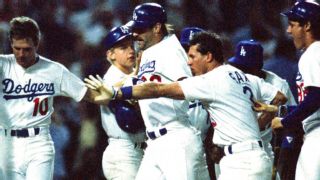 "Don't worry about it, we'll have our day"Kirk Gibson signed with the Dodgers on Jan. 29, 1988, under unusual circumstances. Exactly one week earlier, Gibson and six other players were granted "new look" free agency when an arbitrator ruled that owners had violated the collective bargaining agreement by acting in concert to restrict free agent movement. As a free agent after the 1985 season, Gibson was not offered a contract by any other team due to collusion. The previous year Gibson was named the ALCS MVP and hit two home runs in the deciding Game 5 of the 1984 World Series to lead the Detroit Tigers to the title. Gibson had been seeking a five-year, $7.5 million contract but settled for a three-year, $4.1 million deal to return to Detroit when no other team offered him a contract. When Gibson became a free agent again, the Dodgers signed him to a three-year, $4.5 million contract after the Tigers offered the 31-year-old outfielder, who was born and raised in Michigan, only a one-year extension.  Kirk Gibson (Dodgers outfielder 1988-89): I was with the Tigers my whole career and went through collusion and I had to stay there. When I left Detroit, a lot was said about me. They attacked me and my character and said things about my family. I remember my parents, especially my dad, defended me. Any father or mother would do that, but I told them, "Don't worry about it, we'll have our day." Kirk Gibson (Dodgers outfielder 1988-89): I was with the Tigers my whole career and went through collusion and I had to stay there. When I left Detroit, a lot was said about me. They attacked me and my character and said things about my family. I remember my parents, especially my dad, defended me. Any father or mother would do that, but I told them, "Don't worry about it, we'll have our day."
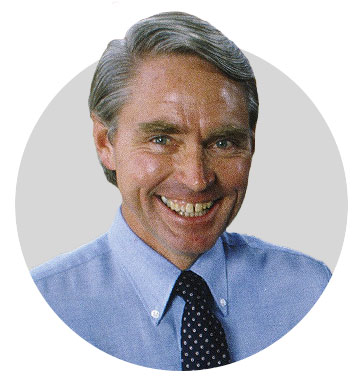 Fred Claire (Dodgers general manager 1987-98): We needed to make some significant changes. We were 16 games under .500 the previous two seasons. I tried to make a trade for Kirk at the winter meetings in 1987, and at that time there was a big question mark if Kirk would be declared a free agent because of the whole collusion case. Fred Claire (Dodgers general manager 1987-98): We needed to make some significant changes. We were 16 games under .500 the previous two seasons. I tried to make a trade for Kirk at the winter meetings in 1987, and at that time there was a big question mark if Kirk would be declared a free agent because of the whole collusion case.
I had long meetings with Tigers general manager Bill Lajoie and was willing to trade Pedro Guerrero for Kirk at the winter meetings. The trade never happened, but when Kirk became a free agent soon after, we made sure to sign him. 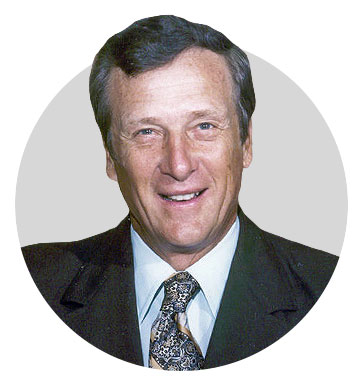 Mel Didier (Dodgers scout 1983-98): I'd been trying to sign Kirk since he was at [Michigan State]. So when Fred Claire called me and said, "I got Kirk Gibson in my office, what do you think?" I said, "I don't give a goddamn if he wants the stadium, give it to him because he's going to help us win." Mel Didier (Dodgers scout 1983-98): I'd been trying to sign Kirk since he was at [Michigan State]. So when Fred Claire called me and said, "I got Kirk Gibson in my office, what do you think?" I said, "I don't give a goddamn if he wants the stadium, give it to him because he's going to help us win."
 Mike Scioscia (Dodgers catcher 1980-92): We all thought we were gamers and played the game hard, but Kirk brought us to a different level. His intensity was off the charts. Mike Scioscia (Dodgers catcher 1980-92): We all thought we were gamers and played the game hard, but Kirk brought us to a different level. His intensity was off the charts.
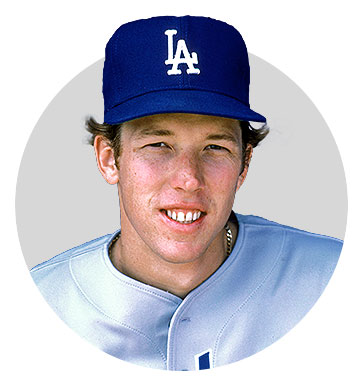 Orel Hershiser (Dodgers pitcher 1983-94): The first game of spring training, Jesse Orosco put eye black inside the edge of Kirk's hat before Kirk went out to run his sprints before that game. The team and the crowd at Vero Beach laughed at Kirk because he had black streaks across his forehead when he took his hat off to run. He didn't take it very well. Orel Hershiser (Dodgers pitcher 1983-94): The first game of spring training, Jesse Orosco put eye black inside the edge of Kirk's hat before Kirk went out to run his sprints before that game. The team and the crowd at Vero Beach laughed at Kirk because he had black streaks across his forehead when he took his hat off to run. He didn't take it very well.
 Gibson: I thought I took it great. Gibson: I thought I took it great.
 Hershiser: He was so mad that he walked off the field and didn't play in that first game. We had a team meeting the next day, and he expressed his desire to play on a team that took the game seriously. Fun is fun, but when it's game time, you don't mess with other people on your team and you do everything you can to win the game even if it's spring training. I think it was a significant moment. Hershiser: He was so mad that he walked off the field and didn't play in that first game. We had a team meeting the next day, and he expressed his desire to play on a team that took the game seriously. Fun is fun, but when it's game time, you don't mess with other people on your team and you do everything you can to win the game even if it's spring training. I think it was a significant moment.
 Gibson won the National League MVP award in 1988 -- hitting .290 with 25 home runs, 76 RBIs, 106 runs scored and 31 stolen bases -- and led the Dodgers to their first division title in three years. In the National League Championship Series, the Dodgers upset the New York Mets in seven games. Gibson hit home runs in Dodgers victories in Games 4 and 5 but was slowed by sore knees, and in the top of the ninth inning of Game 5, he suffered a severely pulled hamstring while sliding to break up a double play at second base. As the Dodgers prepared to face a heavily favored Oakland A's team in the World Series, Gibson looked unlikely to play. "Oh s---, this isn't good" Gibson: After I got hurt in Game 5 in New York, I immediately got an injection. I had gotten on first base, and I tried to break up the double play down there and, because of my leg and my hamstring, I went into second base funky and I twisted my knee on the bag. At that time, I thought I was invincible. I always figured I'd find a way to play. I slept and I got up at 5 in the morning and I immediately got out of bed and I said, "This doesn't feel bad." Then I jogged across my living room floor and it got me and I said, "Oh s---, this isn't good." Gibson: After I got hurt in Game 5 in New York, I immediately got an injection. I had gotten on first base, and I tried to break up the double play down there and, because of my leg and my hamstring, I went into second base funky and I twisted my knee on the bag. At that time, I thought I was invincible. I always figured I'd find a way to play. I slept and I got up at 5 in the morning and I immediately got out of bed and I said, "This doesn't feel bad." Then I jogged across my living room floor and it got me and I said, "Oh s---, this isn't good."
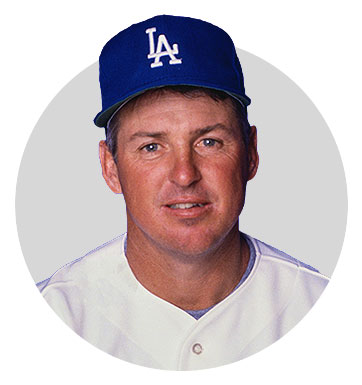 Mickey Hatcher (Dodgers outfielder 1987-90): He could hardly walk. There was no way he was going to run. He couldn't play the outfield, so I knew I was probably going to play. I didn't even think he could pinch hit. I was hurting just watching him walk around the locker room before the game. Mickey Hatcher (Dodgers outfielder 1987-90): He could hardly walk. There was no way he was going to run. He couldn't play the outfield, so I knew I was probably going to play. I didn't even think he could pinch hit. I was hurting just watching him walk around the locker room before the game.
 Gibson: I got to the stadium, and I told them I didn't think I could play. I played in Game 7 [of the NLCS], but this is an ugly feeling. They gave me some more injections in both injuries. Gibson: I got to the stadium, and I told them I didn't think I could play. I played in Game 7 [of the NLCS], but this is an ugly feeling. They gave me some more injections in both injuries.
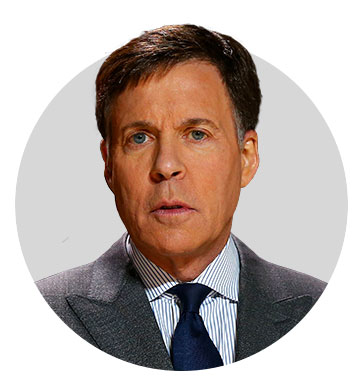 Bob Costas (NBC announcer 1980-present): I remember coming on the air and saying, "First item of business: Kirk Gibson will not play tonight." We had been told he was out. That was how we set the stage for Game 1. Bob Costas (NBC announcer 1980-present): I remember coming on the air and saying, "First item of business: Kirk Gibson will not play tonight." We had been told he was out. That was how we set the stage for Game 1.
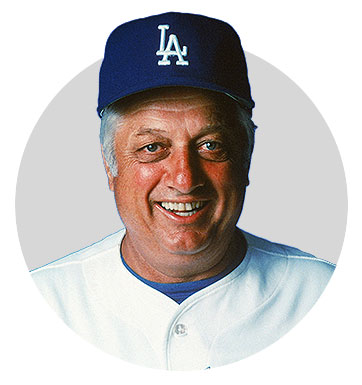 Tommy Lasorda (Dodgers manager 1976-94, now Dodgers special advisor to the chairman): When I came in, he told me he can't play. He was really suffering, and he couldn't do it. If he had half a chance of doing it, he would have done it, but he said, "I just can't do it. My leg is really hurting me." So I figured that was it. Every inning I'd go into the clubhouse and stand at the door of the trainer's room and say, "How are you feeling, big boy?" Maybe he'd feel better and come back out, and each time he put his thumbs down and I'd go back out. Tommy Lasorda (Dodgers manager 1976-94, now Dodgers special advisor to the chairman): When I came in, he told me he can't play. He was really suffering, and he couldn't do it. If he had half a chance of doing it, he would have done it, but he said, "I just can't do it. My leg is really hurting me." So I figured that was it. Every inning I'd go into the clubhouse and stand at the door of the trainer's room and say, "How are you feeling, big boy?" Maybe he'd feel better and come back out, and each time he put his thumbs down and I'd go back out.
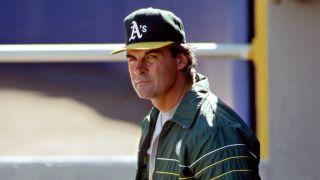 The Dodgers and A's knew each other well. Oakland's Game 1 starter, Dave Stewart, had been with the Dodgers from 1978 to 1983, and L.A.'s starter, Tim Belcher, had been in the Oakland farm system in 1987. The Dodgers also had former A's Jay Howell, Mike Davis and Alfredo Griffin on the roster in 1988, and the A's had former Dodgers Rick Honeycutt, Bob Welch and Matt Young. As far as the A's were concerned, familiarity did not breed respect. "I thought they were the easier team to beat" Lasorda: Don Baylor said he wanted to play the best team in the National League, which was the Mets. No way did they think we were the best team in the National League. I told our guys to make sure we showed Don Baylor who the best team in the National League was. Lasorda: Don Baylor said he wanted to play the best team in the National League, which was the Mets. No way did they think we were the best team in the National League. I told our guys to make sure we showed Don Baylor who the best team in the National League was.
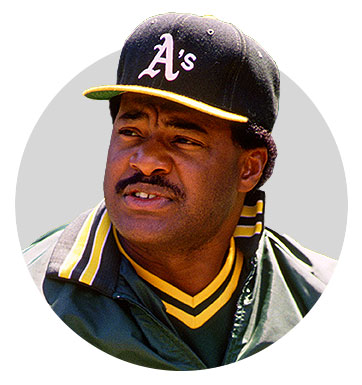 Don Baylor (Oakland A's DH, 1988): The Mets were the better team, and I wanted to play the better team. I was with the Boston Red Sox in 1986, and I wanted another shot at them after they beat us. I wanted another shot at the Mets. It wasn't meant as a slap at the Dodgers, but they took it and made it bulletin board material. That's fine. I don't care. Don Baylor (Oakland A's DH, 1988): The Mets were the better team, and I wanted to play the better team. I was with the Boston Red Sox in 1986, and I wanted another shot at them after they beat us. I wanted another shot at the Mets. It wasn't meant as a slap at the Dodgers, but they took it and made it bulletin board material. That's fine. I don't care.
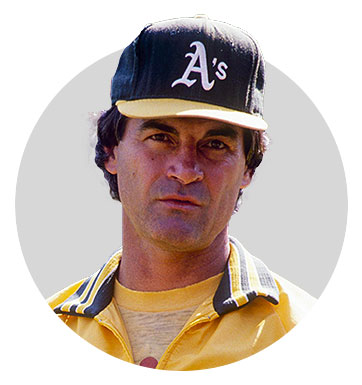 Tony La Russa (Oakland A's manager 1986-95): That was not received well. A couple of our guys made comments that they would rather play the Mets, and that was not smart. It was not sportsmanlike, and Tommy utilized it. That wasn't our style. You always want to pump up the team you're going to play even if they're in last place. We did the opposite of that. Tony La Russa (Oakland A's manager 1986-95): That was not received well. A couple of our guys made comments that they would rather play the Mets, and that was not smart. It was not sportsmanlike, and Tommy utilized it. That wasn't our style. You always want to pump up the team you're going to play even if they're in last place. We did the opposite of that.
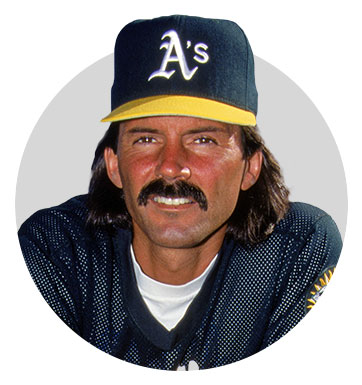 Dennis Eckersley (A's pitcher 1987-95): I was happy the Dodgers won because they shouldn't have beaten the Mets. The better team was obviously the Mets. The Dodgers just played over their heads. I was happy when the Dodgers won because I thought they were the easier team to beat. I didn't want to go to New York. Dennis Eckersley (A's pitcher 1987-95): I was happy the Dodgers won because they shouldn't have beaten the Mets. The better team was obviously the Mets. The Dodgers just played over their heads. I was happy when the Dodgers won because I thought they were the easier team to beat. I didn't want to go to New York.
 Costas: On the face of it, it was a mismatch. I came on the air and said, "Pitching aside, and pitching may carry them through, this could be the worst lineup ever to take the field for a World Series game." Costas: On the face of it, it was a mismatch. I came on the air and said, "Pitching aside, and pitching may carry them through, this could be the worst lineup ever to take the field for a World Series game."
 Hatcher: I don't think anyone could name our starting lineup or our starting pitching besides Orel Hershiser. You talk about World Series teams and everybody can go down the lineup and name them off the top of their head. You go down our lineup and it's: Who? Who? Who? Hatcher: I don't think anyone could name our starting lineup or our starting pitching besides Orel Hershiser. You talk about World Series teams and everybody can go down the lineup and name them off the top of their head. You go down our lineup and it's: Who? Who? Who?
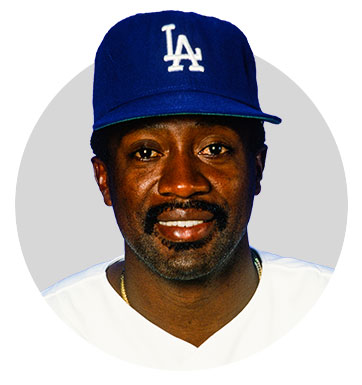 Alfredo Griffin (Dodgers shortstop 1988-91): Nobody believed that we could win. I was with Oakland the year before, and I knew how good they were. That's why I was so sad when Oakland traded me because I knew what kind of team they had and what they were going to do. Alfredo Griffin (Dodgers shortstop 1988-91): Nobody believed that we could win. I was with Oakland the year before, and I knew how good they were. That's why I was so sad when Oakland traded me because I knew what kind of team they had and what they were going to do.
 Mike Davis (Dodgers outfielder 1988-89): All of my buddies were over there with the A's. I had spent so much time with them the year before and was one of the cogs on that team, so I knew those guys very well. There were some great players over there. I heard what they were saying. They had won over 100 games and the Mets had won over 100 games, and they wanted to play each other. The way the Mets beat us during the season, and they really dominated us, they probably thought it was going to happen. But we were a different team in October. Mike Davis (Dodgers outfielder 1988-89): All of my buddies were over there with the A's. I had spent so much time with them the year before and was one of the cogs on that team, so I knew those guys very well. There were some great players over there. I heard what they were saying. They had won over 100 games and the Mets had won over 100 games, and they wanted to play each other. The way the Mets beat us during the season, and they really dominated us, they probably thought it was going to happen. But we were a different team in October.
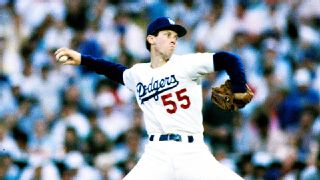 Backing up Gibson and NL Cy Young Award winner Hershiser was a group of Dodgers reserves who called themselves "The Stuntmen" -- because they were ready to step in whenever the stars were unable to go. Hatcher, a reserve outfielder who coined the term in spring training, started in place of Gibson in Game 1 of the Series. Hatcher had hit only one home run in the regular season but delivered a two-run shot in the bottom of the first inning and sprinted around the bases afterward. "He ran like he thought they were going to take it off the scoreboard," NBC color commentator Joe Garagiola said. "I was enjoying the ride, and he was in it for a speed race" Hatcher: I had missed the playoffs and the World Series two times before. I was traded by the Dodgers before they won in 1981 and released by the Minnesota Twins before they won in 1987. Tommy kept teasing me that he was going to get rid of me in 1988. He said, "Every time someone gets rid of you, they win it." So to finally be in a World Series, my energy was through the roof. Honest to goodness, I didn't sleep much during the World Series. I was so excited. Hatcher: I had missed the playoffs and the World Series two times before. I was traded by the Dodgers before they won in 1981 and released by the Minnesota Twins before they won in 1987. Tommy kept teasing me that he was going to get rid of me in 1988. He said, "Every time someone gets rid of you, they win it." So to finally be in a World Series, my energy was through the roof. Honest to goodness, I didn't sleep much during the World Series. I was so excited.
 Lasorda: God must have said let's gift him a home run and let this happen for Mickey. He's such a great competitor. I still can't believe the team we fielded. Jesus! We had Danny Heep in the outfield. I told Danny Heep one time he's so goddamn slow, if he got in a race with a pregnant woman, he'd finish third. Lasorda: God must have said let's gift him a home run and let this happen for Mickey. He's such a great competitor. I still can't believe the team we fielded. Jesus! We had Danny Heep in the outfield. I told Danny Heep one time he's so goddamn slow, if he got in a race with a pregnant woman, he'd finish third.
 Steve Sax (Dodgers second baseman 1981-1988): He almost caught me. I was enjoying the ride, and he was in it for a speed race. Steve Sax (Dodgers second baseman 1981-1988): He almost caught me. I was enjoying the ride, and he was in it for a speed race.
 Costas: There was almost a rah-rah college atmosphere encouraged by Lasorda around that team. They were the little engine that could, and Hatcher kind of embodied that. Costas: There was almost a rah-rah college atmosphere encouraged by Lasorda around that team. They were the little engine that could, and Hatcher kind of embodied that.
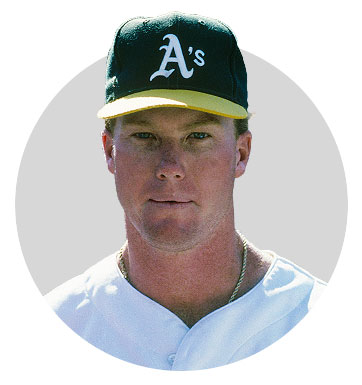 Mark McGwire (A's first baseman 1986-97): It's funny, when you get to the World Series, it's the guys you don't expect that come up big. You put so much emphasis on stopping a couple of guys, and Mickey was one of those high-energy players that always came up big. Mark McGwire (A's first baseman 1986-97): It's funny, when you get to the World Series, it's the guys you don't expect that come up big. You put so much emphasis on stopping a couple of guys, and Mickey was one of those high-energy players that always came up big.
 Sax: The Stuntmen were great. They were a big part of the team. They took their jobs very seriously. They were a force. They weren't just guys who filled in, they took pride in what they did, like stuntmen. They added a lot of pizzazz for our ballclub. Sax: The Stuntmen were great. They were a big part of the team. They took their jobs very seriously. They were a force. They weren't just guys who filled in, they took pride in what they did, like stuntmen. They added a lot of pizzazz for our ballclub.
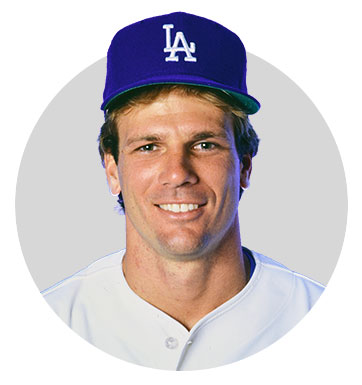 Dave Anderson (Dodgers infielder 1983-89): That group came together and became The Stuntmen in spring training, where starters are only playing four or five innings and then the bench players come on. We'd come in late in games and end up winning games. Dave Anderson (Dodgers infielder 1983-89): That group came together and became The Stuntmen in spring training, where starters are only playing four or five innings and then the bench players come on. We'd come in late in games and end up winning games.
 Scioscia: That was Mickey. He always came up with big hits when he got a chance. We didn't have star power, but I think we had a better team than people give us credit for. Scioscia: That was Mickey. He always came up with big hits when he got a chance. We didn't have star power, but I think we had a better team than people give us credit for.
 Hershiser: Mickey was the ringleader. He was the personality of that group, and he really could have been the MVP of the World Series. If he had a better résumé going into the playoffs, he might have won it. Hershiser: Mickey was the ringleader. He was the personality of that group, and he really could have been the MVP of the World Series. If he had a better résumé going into the playoffs, he might have won it.
 Lasorda: Hatcher was the guy who was supposed to go to Disneyland. They picked Hershiser instead. Lasorda: Hatcher was the guy who was supposed to go to Disneyland. They picked Hershiser instead.
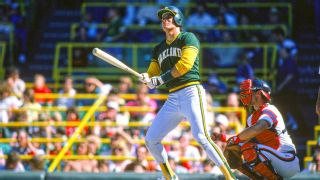 The A's featured a powerful lineup anchored by the "Bash Brothers," Jose Canseco and Mark McGwire, who had combined for 74 home runs and 223 RBIs that season. Canseco, the American League MVP, led the league in home runs, RBIs and slugging percentage. "I never saw that kind of power" Didier: I'll never forget, before the series, we took about 30 to 40 at-bats that each hitter went through with a field that was drawn with the fence line. We went through it player by player, looking at tendencies, flipping through the pages, and at one point, Joey Amalfitano, our third-base coach, stopped us. He said, "Jesus Christ! Who is this?" You looked at the chart and it was Canseco, and all but two of the balls he hit went to the warning track or over the fence. He couldn't get over it. We'd never seen anything like that before. I told him, "That's Canseco. You make a mistake and he'll hit the ball a mile." Didier: I'll never forget, before the series, we took about 30 to 40 at-bats that each hitter went through with a field that was drawn with the fence line. We went through it player by player, looking at tendencies, flipping through the pages, and at one point, Joey Amalfitano, our third-base coach, stopped us. He said, "Jesus Christ! Who is this?" You looked at the chart and it was Canseco, and all but two of the balls he hit went to the warning track or over the fence. He couldn't get over it. We'd never seen anything like that before. I told him, "That's Canseco. You make a mistake and he'll hit the ball a mile."
 Sax: I never saw that kind of power. When he hit it, I thought the center fielder was going to catch it. It was on a line the whole way. I thought, if this is what we're going to have to contend with, this is going to be a long road for us. Sax: I never saw that kind of power. When he hit it, I thought the center fielder was going to catch it. It was on a line the whole way. I thought, if this is what we're going to have to contend with, this is going to be a long road for us.
 Didier: When Canseco hit that grand slam and hit the camera, I looked at my wife and said, "We're going to have a long night." Didier: When Canseco hit that grand slam and hit the camera, I looked at my wife and said, "We're going to have a long night."
 La Russa: Our team had a really relentless competitive attitude that season. We never backed off, ever, but I thought we got comfortable after that. We didn't do enough work to keep our timing. Frankly, I didn't think I did as well as Tommy did to feel that urgency to compete. I wasn't real happy with myself. I'm still not. La Russa: Our team had a really relentless competitive attitude that season. We never backed off, ever, but I thought we got comfortable after that. We didn't do enough work to keep our timing. Frankly, I didn't think I did as well as Tommy did to feel that urgency to compete. I wasn't real happy with myself. I'm still not.
 Griffin: If we didn't have the right frame of mind, we would have given up, but after we beat the Mets, we thought anything was possible. We never gave up. Griffin: If we didn't have the right frame of mind, we would have given up, but after we beat the Mets, we thought anything was possible. We never gave up.
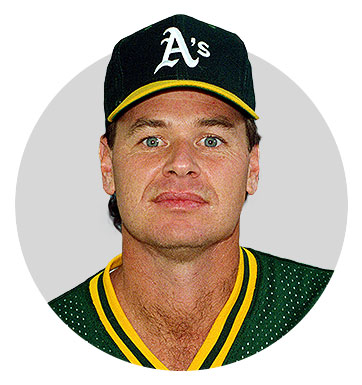 Rick Honeycutt (Oakland A's pitcher 1987-93, now Dodgers pitching coach): I remember it knocked the camera guy off his stand in dead center field. I think it maybe gave us a false sense of confidence that we're going to run over these guys. That was our style to get a lead early and pile on after that. Rick Honeycutt (Oakland A's pitcher 1987-93, now Dodgers pitching coach): I remember it knocked the camera guy off his stand in dead center field. I think it maybe gave us a false sense of confidence that we're going to run over these guys. That was our style to get a lead early and pile on after that.
 Costas: The ball hit the side of the camera and dented it, and the next night Canseco went out and autographed the camera above the dent. Costas: The ball hit the side of the camera and dented it, and the next night Canseco went out and autographed the camera above the dent.
 Lasorda: I thought it was going to be a tough day after that. Belcher was pitching, and I said, "Goddamn, c'mon, man.'' He started pitching after that, but it put us in a hole. Lasorda: I thought it was going to be a tough day after that. Belcher was pitching, and I said, "Goddamn, c'mon, man.'' He started pitching after that, but it put us in a hole.
The Dodgers trailed 4-3 entering the bottom of the eighth inning when the NBC cameras panned the dugout. Gibson was in the training room with bags of ice on both legs, watching the game and listening to Vin Scully's call. Nearby, 25-year-old Dodgers bat boy Mitch Poole, who had clubhouse duty that night, was doing laundry while the game played in the background. "There is no Gibson," Scully said. "The man who was the spearhead of the Dodgers' offense throughout the year, who saved them in the league championship series, will not see any action tonight for sure. He is not even in the dugout." "Go get my uniform, Mitch" Vin Scully (Dodgers announcer 1950-2016, NBC announcer 1983-89): In the middle of the ninth inning of that game, we were in commercial, and I had told the producer and director, "When we come out of commercial, follow me." You don't do that very often, but in this instance, I felt it was important, so when we came out of commercial, there was a shot from the blimp of Dodger Stadium and I said, "If you're in the ballpark with binoculars, your first thought would be, late in the game, Is Kirk Gibson in the Dodgers' dugout? The answer would appear to be no." They did a slow pan from one end of the dugout to the other, and I basically said Kirk Gibson will not play tonight. Vin Scully (Dodgers announcer 1950-2016, NBC announcer 1983-89): In the middle of the ninth inning of that game, we were in commercial, and I had told the producer and director, "When we come out of commercial, follow me." You don't do that very often, but in this instance, I felt it was important, so when we came out of commercial, there was a shot from the blimp of Dodger Stadium and I said, "If you're in the ballpark with binoculars, your first thought would be, late in the game, Is Kirk Gibson in the Dodgers' dugout? The answer would appear to be no." They did a slow pan from one end of the dugout to the other, and I basically said Kirk Gibson will not play tonight.
 Gibson: I was sitting there, and when Vin said that, I stood up and said, "My ass!" It was time to go get dressed. That's not to say I wouldn't have gotten dressed if he hadn't said it, but he did say it, and I was vocal about it with whoever was around me at the time. Gibson: I was sitting there, and when Vin said that, I stood up and said, "My ass!" It was time to go get dressed. That's not to say I wouldn't have gotten dressed if he hadn't said it, but he did say it, and I was vocal about it with whoever was around me at the time.
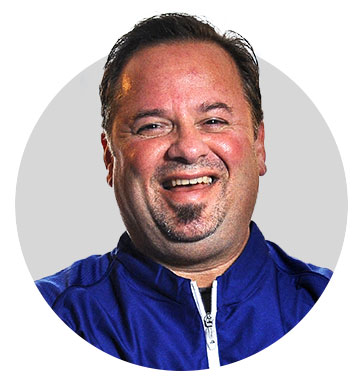 Mitch Poole (Dodgers bat boy 1985-88, now Dodgers clubhouse manager): I happened to be walking through the training room and picking up some towels. I stood there for a little bit grabbing my stuff, and I saw Kirk there on the table, and Vin had said something about Gibby not being able to play in the game because of his injury. Gibby got angry and said, "Go get my uniform, Mitch!" So I did. Mitch Poole (Dodgers bat boy 1985-88, now Dodgers clubhouse manager): I happened to be walking through the training room and picking up some towels. I stood there for a little bit grabbing my stuff, and I saw Kirk there on the table, and Vin had said something about Gibby not being able to play in the game because of his injury. Gibby got angry and said, "Go get my uniform, Mitch!" So I did.
 Hershiser: I was in the video room because I wanted to watch the game on TV and not the bench because I wanted to scout them since I was pitching in Game 2. When Vin Scully said Gibby wasn't going to play, he got so mad. He got up, got the ice off and got his uniform on and went to go hit. Hershiser: I was in the video room because I wanted to watch the game on TV and not the bench because I wanted to scout them since I was pitching in Game 2. When Vin Scully said Gibby wasn't going to play, he got so mad. He got up, got the ice off and got his uniform on and went to go hit.
 Scully: He told me later that it did something to him. He said he threw the ice off his legs and hollered, "Bulls---!" Scully: He told me later that it did something to him. He said he threw the ice off his legs and hollered, "Bulls---!"
 Gibson: I told Mitch to go get the tee and set it up. I put the bare minimum on for the uniform. Gibson: I told Mitch to go get the tee and set it up. I put the bare minimum on for the uniform.
 Poole: I walked with Kirk back from the training room to this little cheap old cage area, and I set up the tee for him to hit off of. Ben Hines, our hitting coach, walked by, and I remember Kirk saying, "Ben, can you help me out?" And Ben said, "Why don't you get Mitch to help you?" It's not like I knew anything about hitting. I was just helping him out. He was telling the location of where he wanted it. I was sitting on the edge of a bucket and pulling the baseballs out of it and putting them on a tee. Halfway through us doing that, he looked down at me and didn't say anything. I go, "Yeah?" He said, "Mitch, this could be the script." Poole: I walked with Kirk back from the training room to this little cheap old cage area, and I set up the tee for him to hit off of. Ben Hines, our hitting coach, walked by, and I remember Kirk saying, "Ben, can you help me out?" And Ben said, "Why don't you get Mitch to help you?" It's not like I knew anything about hitting. I was just helping him out. He was telling the location of where he wanted it. I was sitting on the edge of a bucket and pulling the baseballs out of it and putting them on a tee. Halfway through us doing that, he looked down at me and didn't say anything. I go, "Yeah?" He said, "Mitch, this could be the script."
 Hershiser: He couldn't even bend back over to put the ball on the tee after he hit it. All he was trying to do was find a stance so that when he swung the bat, he wouldn't fall over. He would swing the bat and hit the ball off the tee, and he would stumble, so he was changing the width of his stance and the crouch. He was trying to find a stable enough stance so that he could swing the bat. He was just trying to find a stance that he could stand up on two pegs. Hershiser: He couldn't even bend back over to put the ball on the tee after he hit it. All he was trying to do was find a stance so that when he swung the bat, he wouldn't fall over. He would swing the bat and hit the ball off the tee, and he would stumble, so he was changing the width of his stance and the crouch. He was trying to find a stable enough stance so that he could swing the bat. He was just trying to find a stance that he could stand up on two pegs.
 Costas: I went down at the start of the ninth inning, and I was going to go on the field and interview somebody from the Dodgers postgame whether they won or lost. At that time, broadcasters couldn't be in the dugout, so I was breaking the rules, but I was in the corner. As I'm standing there, I can hear Gibson hitting off a tee, and I walked down the tunnel to make sure it was him, and it was. He's grunting with each swing. Thwack! Ugh! Thwack! Ugh! Costas: I went down at the start of the ninth inning, and I was going to go on the field and interview somebody from the Dodgers postgame whether they won or lost. At that time, broadcasters couldn't be in the dugout, so I was breaking the rules, but I was in the corner. As I'm standing there, I can hear Gibson hitting off a tee, and I walked down the tunnel to make sure it was him, and it was. He's grunting with each swing. Thwack! Ugh! Thwack! Ugh!
 Gibson: I didn't take a lot of swings before I told Mitch to go get Tommy. Gibson: I didn't take a lot of swings before I told Mitch to go get Tommy.
 Poole: I was wearing cut-off shorts and a Dodger T-shirt, so I looked kind of brutal going out there. I was yelling at Tommy from the other end of the dugout, and he was acting like I was a gnat on his shoulder. He goes, "What do you want?!" I yelled at him, "Get over here!" So he finally came down, and I told him that Gibby says he can hit. Poole: I was wearing cut-off shorts and a Dodger T-shirt, so I looked kind of brutal going out there. I was yelling at Tommy from the other end of the dugout, and he was acting like I was a gnat on his shoulder. He goes, "What do you want?!" I yelled at him, "Get over here!" So he finally came down, and I told him that Gibby says he can hit.
 Lasorda: I didn't think he'd be able to play. When the ninth inning came around, we had Mike Scioscia coming up, followed by Jeff Hamilton, Alfredo Griffin and the pitcher's spot. I was going to have Mike Davis hit for the pitcher. As I'm trying to figure out what I'm going to do, the clubhouse kid is trying to get my attention. I said, "Mitch, leave me alone, goddamn it! I'm trying to get this ninth inning set up." He said Kirk wanted to talk to me, so I went over. I go there in the back, and Kirk has his uniform on. He says, "I think I can hit for ya." Lasorda: I didn't think he'd be able to play. When the ninth inning came around, we had Mike Scioscia coming up, followed by Jeff Hamilton, Alfredo Griffin and the pitcher's spot. I was going to have Mike Davis hit for the pitcher. As I'm trying to figure out what I'm going to do, the clubhouse kid is trying to get my attention. I said, "Mitch, leave me alone, goddamn it! I'm trying to get this ninth inning set up." He said Kirk wanted to talk to me, so I went over. I go there in the back, and Kirk has his uniform on. He says, "I think I can hit for ya."
 Gibson: When Tommy finally came waddling over, I said: "Hit Davis eighth, and I'll hit for the pitcher." He just said, "You stay here," which I did for part of the time, but I had to get out there and get a feel for the environment. Gibson: When Tommy finally came waddling over, I said: "Hit Davis eighth, and I'll hit for the pitcher." He just said, "You stay here," which I did for part of the time, but I had to get out there and get a feel for the environment.
 Lasorda: He wanted to go to the on-deck circle, but I wanted to play a little game with the A's. I didn't want them to know that he was capable of playing. Lasorda: He wanted to go to the on-deck circle, but I wanted to play a little game with the A's. I didn't want them to know that he was capable of playing.
 Hershiser: When I knew he was able to hit, I went back on the bench and watched the inning develop, and I sat down next to Mike Scioscia and I told him, "If we get this inning going, do you know who's going to hit for Dave Anderson?" He said, "No, who?" I said, "Gibson." He said, "Gibson?! He can't even walk." Hershiser: When I knew he was able to hit, I went back on the bench and watched the inning develop, and I sat down next to Mike Scioscia and I told him, "If we get this inning going, do you know who's going to hit for Dave Anderson?" He said, "No, who?" I said, "Gibson." He said, "Gibson?! He can't even walk."
 Costas: After Lasorda went down to check on Gibson and came walking back, he saw me there, and he's profanely saying, "Look, bleeping Costas is here. They think the bleeping game is over. They think it's time for the bleeping postgame show." Costas: After Lasorda went down to check on Gibson and came walking back, he saw me there, and he's profanely saying, "Look, bleeping Costas is here. They think the bleeping game is over. They think it's time for the bleeping postgame show."
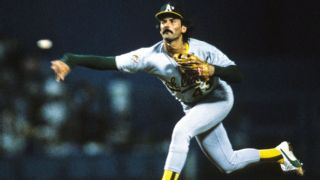 Dennis Eckersley relieved Dave Stewart in the ninth inning, a move that angered Stewart, who watched the rest of the game from the clubhouse. "I know Dave Stewart wanted to finish the game; most guys do, but why not go with me?" Eckersley says now with a smile. "Slam dunk, right? C'mon. You can't second-guess that." Eckersley led the American League in 1988 with 45 saves and a 2.35 ERA. With two outs, Lasorda sent former Oakland outfielder Mike Davis to the plate as a pinch-hitter. Davis had been a near All-Star with Oakland in 1987 but had struggled in Los Angeles (after stepping into a sprinkler hole in spring training), collecting only 55 hits and 24 walks on the season. "I had gotten a message from God" Davis: I sucked that season. Davis: I sucked that season.
 Lasorda: I put Mike Davis out there with two outs. He needed to get on for Gibson to get up. Lasorda: I put Mike Davis out there with two outs. He needed to get on for Gibson to get up.
 Davis: I was probably the last player Tommy had to use. I was in Tommy's doghouse by that time. I didn't even know if I was going to get a chance to play at all. I spent a lot of time in prayer, talking to God. In the midst of my nightmare, I had gotten a message from God that I was going to do something in the World Series. I was going to hit a home run. So when I came to the plate in the ninth inning, that's exactly what I was expecting to do. That's the word I had heard. I got one swing at it and just missed it and fouled it straight back. The next four pitches he threw were about 5 to 6 inches [off] the outside part of the plate. Davis: I was probably the last player Tommy had to use. I was in Tommy's doghouse by that time. I didn't even know if I was going to get a chance to play at all. I spent a lot of time in prayer, talking to God. In the midst of my nightmare, I had gotten a message from God that I was going to do something in the World Series. I was going to hit a home run. So when I came to the plate in the ninth inning, that's exactly what I was expecting to do. That's the word I had heard. I got one swing at it and just missed it and fouled it straight back. The next four pitches he threw were about 5 to 6 inches [off] the outside part of the plate.
 Griffin: I knew the situation was right for him. When Tommy told me he was pinch-hitting for me, I understood. He was a better hitter. The thing that surprised me was that he walked. He never walked. Griffin: I knew the situation was right for him. When Tommy told me he was pinch-hitting for me, I understood. He was a better hitter. The thing that surprised me was that he walked. He never walked.
 Eckersley: The story is Michael Davis. That's the story. I walked him! I don't walk anybody! I gave him too much credit. I had played with Michael the year before, and he hit over 20 home runs with us. I gave him way too much credit. I missed the outside corner a couple of times and I walked him, and I did not want to do that. In my mind, I wasn't facing the guy who was hitting under .200 for the Dodgers. That's where it all goes wrong. I'm facing the guy that I had played with and respected his power. I just got a little too careful on the corner. That was the worst part of it. I had to get him out or at least have him put the ball in play. I could've lived with that. I was too concerned about Michael Davis. I might have been the only one who was. Eckersley: The story is Michael Davis. That's the story. I walked him! I don't walk anybody! I gave him too much credit. I had played with Michael the year before, and he hit over 20 home runs with us. I gave him way too much credit. I missed the outside corner a couple of times and I walked him, and I did not want to do that. In my mind, I wasn't facing the guy who was hitting under .200 for the Dodgers. That's where it all goes wrong. I'm facing the guy that I had played with and respected his power. I just got a little too careful on the corner. That was the worst part of it. I had to get him out or at least have him put the ball in play. I could've lived with that. I was too concerned about Michael Davis. I might have been the only one who was.
 La Russa: Eck remembers how good Davis was when he was with us, and he knew he had to keep him in the park. Throughout his career as a closer, Eck was going to make you put the ball in play or strike you out. I'm sure Eck has more regret about walking Davis than anything else that happened in that game. La Russa: Eck remembers how good Davis was when he was with us, and he knew he had to keep him in the park. Throughout his career as a closer, Eck was going to make you put the ball in play or strike you out. I'm sure Eck has more regret about walking Davis than anything else that happened in that game.
 Lasorda: I knew they wouldn't pitch to Mike Davis because I put the decoy, Dave Anderson, in the on-deck circle. Davis played for them the year before and was good. So consequently they were not going to let him hit the ball. I remember [A's catcher] Ron Hassey pointing at Anderson in the on-deck circle. Lasorda: I knew they wouldn't pitch to Mike Davis because I put the decoy, Dave Anderson, in the on-deck circle. Davis played for them the year before and was good. So consequently they were not going to let him hit the ball. I remember [A's catcher] Ron Hassey pointing at Anderson in the on-deck circle.
 Eckersley: I didn't want to walk him, and it wasn't because I knew who was on deck. I just lost him. I shouldn't have walked him. Mike could run a little bit, too, so I knew they were going to mess around there. Anderson was on deck, but he wasn't even on my mind. Eckersley: I didn't want to walk him, and it wasn't because I knew who was on deck. I just lost him. I shouldn't have walked him. Mike could run a little bit, too, so I knew they were going to mess around there. Anderson was on deck, but he wasn't even on my mind.
 Davis: I always thought he never read the stat sheet from that season, because I was bad. I was really bad that year. If I had read my stat sheet that year, I would have come right at me. I played well when we played together in Oakland, so I guess pitchers remember hitters the same way hitters remember pitchers. Davis: I always thought he never read the stat sheet from that season, because I was bad. I was really bad that year. If I had read my stat sheet that year, I would have come right at me. I played well when we played together in Oakland, so I guess pitchers remember hitters the same way hitters remember pitchers.
 McGwire: There was no reason to walk Mike Davis. The worst thing that could have happened is, if Mike Davis hits a homer, it's a tie ballgame. McGwire: There was no reason to walk Mike Davis. The worst thing that could have happened is, if Mike Davis hits a homer, it's a tie ballgame.
 Lasorda: After Davis got on, Eck probably figured Anderson doesn't have a f---ing chance against me. That's when he got the surprise of his life. Anderson didn't walk in that batter's box, Kirk Gibson did. Lasorda: After Davis got on, Eck probably figured Anderson doesn't have a f---ing chance against me. That's when he got the surprise of his life. Anderson didn't walk in that batter's box, Kirk Gibson did.
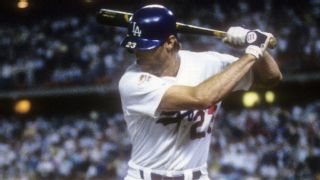 As Davis walked to first base, Dave Anderson quickly turned around and exited stage right as Gibson hobbled out of the Dodgers' dugout. "And look who's coming up," Scully said on the NBC broadcast. "All year long, they looked to him to light the fire, and all year long, he answered the demands until he was unable to start tonight with two bad legs. ... With two outs, you talk about a roll of the dice, this is it." "It was my calling" Anderson: I knew if we had a chance to win, Kirk was going to hit. Anderson: I knew if we had a chance to win, Kirk was going to hit.
 Gibson: I told myself when I stepped out onto the field that the ovation and the environment would be outstanding and I wouldn't hurt anymore, and it was true. I didn't stay in the on-deck circle very long. I just walked up there. Gibson: I told myself when I stepped out onto the field that the ovation and the environment would be outstanding and I wouldn't hurt anymore, and it was true. I didn't stay in the on-deck circle very long. I just walked up there.
 Lasorda: The crowd ... I can never explain it. The emotion, the reaction of that crowd that night. I've been here a long time. I've never seen anything like that. I got goosebumps because of the reaction of the fans. "Son of a b----," I said, "I'm going to give him two strikes to hit the ball out of the ballpark. If he doesn't, we'll play for a tie." Lasorda: The crowd ... I can never explain it. The emotion, the reaction of that crowd that night. I've been here a long time. I've never seen anything like that. I got goosebumps because of the reaction of the fans. "Son of a b----," I said, "I'm going to give him two strikes to hit the ball out of the ballpark. If he doesn't, we'll play for a tie."
 Eckersley: I was thinking he shouldn't even be in this game. All I had to do was throw him fastballs because he had no chance. At the same time, I knew Michael Davis, and he can run a little bit, so I knew there's going to be a little cat-and-mouse there. I threw a ton of fastballs to Gibson, and he looked bad on a bunch of them. Eckersley: I was thinking he shouldn't even be in this game. All I had to do was throw him fastballs because he had no chance. At the same time, I knew Michael Davis, and he can run a little bit, so I knew there's going to be a little cat-and-mouse there. I threw a ton of fastballs to Gibson, and he looked bad on a bunch of them.
 Scully: When he's going up to home plate to hit, I'm thinking to myself, almost a little prayer, please don't let him strike out. It's been such a great year for him; he's led the Dodgers through thick and thin; it's a national stage; don't let him strike out. I don't expect him to be able to do anything. He can hardly stand, never mind walk and run, but please, just don't let him strike out. Scully: When he's going up to home plate to hit, I'm thinking to myself, almost a little prayer, please don't let him strike out. It's been such a great year for him; he's led the Dodgers through thick and thin; it's a national stage; don't let him strike out. I don't expect him to be able to do anything. He can hardly stand, never mind walk and run, but please, just don't let him strike out.
 Eckersley: He fouled away the first two pitches, and after he swung, he looked so feeble. I thought I was going to blow him away. I thought he was a lamb. I'm thinking I'm going to throw him a high fastball and he's done. Eckersley: He fouled away the first two pitches, and after he swung, he looked so feeble. I thought I was going to blow him away. I thought he was a lamb. I'm thinking I'm going to throw him a high fastball and he's done.
 Hershiser: It was terrible. Just terrible. We were in the dugout thinking he shouldn't have even tried to hit. Hershiser: It was terrible. Just terrible. We were in the dugout thinking he shouldn't have even tried to hit.
 Costas: His swings were so weak. They were emergency swings. He's just trying to hang in. He was wobbling. If he hit the ball off the wall, they might have thrown him out at first. Costas: His swings were so weak. They were emergency swings. He's just trying to hang in. He was wobbling. If he hit the ball off the wall, they might have thrown him out at first.
 Gibson: I remember hitting the little dribbler down the line, and it wasn't pretty. Gibson: I remember hitting the little dribbler down the line, and it wasn't pretty.
 La Russa: If it was anybody else that we didn't know, you wonder if he was milking the moment, but knowing Kirk as well as we knew him from the American League when he was with Detroit, we knew he was one of the great competitors. He was really hurting. La Russa: If it was anybody else that we didn't know, you wonder if he was milking the moment, but knowing Kirk as well as we knew him from the American League when he was with Detroit, we knew he was one of the great competitors. He was really hurting.
 Lasorda: I wasn't sure what Gibson could do, but I wanted Davis to steal after he got on because you could steal on Eckersley at will. Lasorda: I wasn't sure what Gibson could do, but I wanted Davis to steal after he got on because you could steal on Eckersley at will.
 Davis: Dennis Eckersley was really easy to steal off of. He had a really big leg kick. I knew I could steal the base, but I also knew if I got thrown out stealing second with Kirk Gibson up at the plate, then you might as well bury me at second base because all of L.A. would've hated my guts. Davis: Dennis Eckersley was really easy to steal off of. He had a really big leg kick. I knew I could steal the base, but I also knew if I got thrown out stealing second with Kirk Gibson up at the plate, then you might as well bury me at second base because all of L.A. would've hated my guts.
 Eckersley: Davis kept trying to steal, and that's so annoying. People don't realize that it really distracts a pitcher when you have to keep looking back. But we had to concern ourselves with the stolen base because that was the tying run. It distracted me a little bit, but I was still confident that I was going to blow Gibson away. Eckersley: Davis kept trying to steal, and that's so annoying. People don't realize that it really distracts a pitcher when you have to keep looking back. But we had to concern ourselves with the stolen base because that was the tying run. It distracted me a little bit, but I was still confident that I was going to blow Gibson away.
 Lasorda: I didn't want Davis to steal right away for fear that they would walk Gibson to pitch to Steve Sax. I wanted to wait until two strikes, and that's when we stole. Then they're not going to walk the guy with two strikes. I'm sure he was thinking, let's get this game over with. Let's get that big crippled guy out and let's go home. Lasorda: I didn't want Davis to steal right away for fear that they would walk Gibson to pitch to Steve Sax. I wanted to wait until two strikes, and that's when we stole. Then they're not going to walk the guy with two strikes. I'm sure he was thinking, let's get this game over with. Let's get that big crippled guy out and let's go home.
 Sax: I was in the on-deck circle thinking about how I was going to win the game, because if he walked, he would be on first, we'd have a runner on second, and it was going to be up to me to win it. So I was really trying to hone in on Eckersley and what my strengths would have been against him. I was thinking, "How am I going to win this game?" Kirk was coming at this thing at a disadvantage, so I had to figure it wasn't going to happen and I was going to have to win the game myself. Sax: I was in the on-deck circle thinking about how I was going to win the game, because if he walked, he would be on first, we'd have a runner on second, and it was going to be up to me to win it. So I was really trying to hone in on Eckersley and what my strengths would have been against him. I was thinking, "How am I going to win this game?" Kirk was coming at this thing at a disadvantage, so I had to figure it wasn't going to happen and I was going to have to win the game myself.
 Gibson: I knew when the opportunity came up, mentally -- I thought I could do it. We had something really magical going on here in '88. I just knew it. It was my calling. It was like someone was telling me, "C'mon, let's go. It's time to do your thing." I believed in it. Gibson: I knew when the opportunity came up, mentally -- I thought I could do it. We had something really magical going on here in '88. I just knew it. It was my calling. It was like someone was telling me, "C'mon, let's go. It's time to do your thing." I believed in it.
 Davis: After I stole second base, I could exhale because I was safe and standing there. We were in a good position to do some things. Davis: After I stole second base, I could exhale because I was safe and standing there. We were in a good position to do some things.
 Hatcher: I don't think the players in the dugout were really energized about that at-bat until Davis stole second. That's when everyone really felt, if Gibby can just get a hit, we can tie this game. We really felt Gibby had a chance to put the ball in play and tie the game. Hatcher: I don't think the players in the dugout were really energized about that at-bat until Davis stole second. That's when everyone really felt, if Gibby can just get a hit, we can tie this game. We really felt Gibby had a chance to put the ball in play and tie the game.
 La Russa: I told [pitching coach] Dave Duncan that I was really worried about Gibson's strength after Davis got on second. I wasn't thinking about a home run, but I was thinking about a looping liner or a ground ball that found a hole to tie the score. La Russa: I told [pitching coach] Dave Duncan that I was really worried about Gibson's strength after Davis got on second. I wasn't thinking about a home run, but I was thinking about a looping liner or a ground ball that found a hole to tie the score.
 Gibson: When Mike Davis finally got to second base, I thought just dink it over the shortstop, just score him and tie it up. That's really all I was thinking at the time. I was just thinking about keeping the inning going the whole at-bat. Gibson: When Mike Davis finally got to second base, I thought just dink it over the shortstop, just score him and tie it up. That's really all I was thinking at the time. I was just thinking about keeping the inning going the whole at-bat.
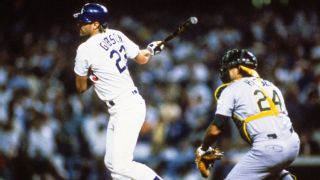 As Gibson stood in, the words of Mel Didier returned to him. "Sure as I'm standing here breathing" Didier: We put the scouting report for Oakland together. It was me, Jerry Stephenson and Steve Boros. We stayed up until 5 o'clock in the morning and came back Thursday afternoon and finished and polished it up and made it like a booklet. Tommy held a workout Friday morning before Game 1 on Saturday, and Tommy said he wanted us to present the scouting report. Didier: We put the scouting report for Oakland together. It was me, Jerry Stephenson and Steve Boros. We stayed up until 5 o'clock in the morning and came back Thursday afternoon and finished and polished it up and made it like a booklet. Tommy held a workout Friday morning before Game 1 on Saturday, and Tommy said he wanted us to present the scouting report.
 Lasorda: We had an unbelievable scouting department. Lasorda: We had an unbelievable scouting department.
 Didier: I had scouted the pitchers in the scouting report, and after I was done talking to the team about each guy, I turned, and all the left-handed hitters were sitting on the floor in the dressing room. There was Kirk and Scioscia and Mike Davis and all the left-handed guys, and I pointed to them and I said, "Now remember, and don't ever forget this, if you're up in the ninth inning and we're down or it's tied and you get to 3-and-2 against Eckersley -- partner, sure as I'm standing here breathing, you're going to see a 3-2 backdoor slider." Didier: I had scouted the pitchers in the scouting report, and after I was done talking to the team about each guy, I turned, and all the left-handed hitters were sitting on the floor in the dressing room. There was Kirk and Scioscia and Mike Davis and all the left-handed guys, and I pointed to them and I said, "Now remember, and don't ever forget this, if you're up in the ninth inning and we're down or it's tied and you get to 3-and-2 against Eckersley -- partner, sure as I'm standing here breathing, you're going to see a 3-2 backdoor slider."
 Scioscia: I remember sitting there in that meeting and Mel really stressed that. I can still hear him to this day. Scioscia: I remember sitting there in that meeting and Mel really stressed that. I can still hear him to this day.
 Gibson: When it got to a 3-2 count, I thought about Mel Didier. I stepped out and told myself, "Partner, sure as I'm standing here breathing, you're going to see a 3-2 backdoor slider." Gibson: When it got to a 3-2 count, I thought about Mel Didier. I stepped out and told myself, "Partner, sure as I'm standing here breathing, you're going to see a 3-2 backdoor slider."
 Didier: I was sitting with my wife at the end of the Dodgers' dugout when he came up. I could see him smiling as he backed out of the box when the count got to 3-2 and he took a second and stepped back in. He told me later he could hear my voice in his head, and as soon as the pitch came, he knew what it was. Didier: I was sitting with my wife at the end of the Dodgers' dugout when he came up. I could see him smiling as he backed out of the box when the count got to 3-2 and he took a second and stepped back in. He told me later he could hear my voice in his head, and as soon as the pitch came, he knew what it was.
 Poole: When we were in the back, he told me where that 3-2 backdoor slider would go. He was definitely thinking about it then. There's no doubt in my mind that he knew it was coming. I didn't really notice it at the time, but he visualized a lot of things. He was a very visual person. He knew exactly what to look for. Poole: When we were in the back, he told me where that 3-2 backdoor slider would go. He was definitely thinking about it then. There's no doubt in my mind that he knew it was coming. I didn't really notice it at the time, but he visualized a lot of things. He was a very visual person. He knew exactly what to look for.
 Gibson: Does that mean I just sat there and looked for it? No. It's just subconsciously how you operate. I read a book from Jack Nicklaus a long time ago that when he stands on the tee, he visualizes the ball rolling into the cup. He doesn't think about the swing, he thinks about the end result. That's kind of where I was. But when Davis stole second, I was literally trying to hit the ball over the shortstop's head. Gibson: Does that mean I just sat there and looked for it? No. It's just subconsciously how you operate. I read a book from Jack Nicklaus a long time ago that when he stands on the tee, he visualizes the ball rolling into the cup. He doesn't think about the swing, he thinks about the end result. That's kind of where I was. But when Davis stole second, I was literally trying to hit the ball over the shortstop's head.
 La Russa: The slider was really the wrong pitch to throw him. La Russa: The slider was really the wrong pitch to throw him.
 Eckersley: I kind of laughed when I first heard about the scouting report because I never got anybody to 3-2. But you know what? Good for Didier. If that's what was on Kirk's mind and that's what he remembered, kudos to Didier for being right. Eckersley: I kind of laughed when I first heard about the scouting report because I never got anybody to 3-2. But you know what? Good for Didier. If that's what was on Kirk's mind and that's what he remembered, kudos to Didier for being right.
 McGwire: That backdoor slider was probably the only pitch he could get the barrel on the ball, and he got it. I knew it was gone. I actually think I started walking straight off. Whenever they do that replay, you can always see me. The ball went right over my head. It's still hard to watch. McGwire: That backdoor slider was probably the only pitch he could get the barrel on the ball, and he got it. I knew it was gone. I actually think I started walking straight off. Whenever they do that replay, you can always see me. The ball went right over my head. It's still hard to watch.
 Costas: When you look at the swing, it's almost flat-footed. It's all arms. How the hell, with that swing, he hit the ball that way, I'll never know, and I don't know that he knows. Costas: When you look at the swing, it's almost flat-footed. It's all arms. How the hell, with that swing, he hit the ball that way, I'll never know, and I don't know that he knows.
 La Russa: He didn't swing at that ball very hard. He actually just flipped it. La Russa: He didn't swing at that ball very hard. He actually just flipped it.
 Scioscia: He hit that home run off of one leg. He had good extension, but he was on one leg. Scioscia: He hit that home run off of one leg. He had good extension, but he was on one leg.
 Hatcher: It was all hands and upper body. He had no legs in that swing. Hatcher: It was all hands and upper body. He had no legs in that swing.
 Sax: I knew it as soon as he hit. He hit it right on the meat of the bat. I'll never forget that sound. Sax: I knew it as soon as he hit. He hit it right on the meat of the bat. I'll never forget that sound.
 La Russa: I knew it was gone, and I got very vulgar about it in the dugout. La Russa: I knew it was gone, and I got very vulgar about it in the dugout.
 Eckersley: Shocking. It was beyond shocking. It hits you as soon as it lands. The reality really kicks in. It was just so surreal. Eckersley: Shocking. It was beyond shocking. It hits you as soon as it lands. The reality really kicks in. It was just so surreal.
 Scully: When the ball is hit, my first thought is to look at the outfielder, Jose Canseco. As soon as he turned, after a thousand years of doing this, I realize the ball has a chance to go all the way. That's when I said, "She is gone!" Scully: When the ball is hit, my first thought is to look at the outfielder, Jose Canseco. As soon as he turned, after a thousand years of doing this, I realize the ball has a chance to go all the way. That's when I said, "She is gone!"
 Gibson: The feeling was pretty awesome. I didn't know what to do. There are so many things that go through your mind in a short period of time. I thought about my parents and everything they went through when I left Detroit. That's my most vivid memory as I was running around the bases. They had to take that s--- for so long, and finally we made our statement. I told them I was going to do it right. I'm going to grow up and do it right and we're going to have our day and we're going to have our moment. Gibson: The feeling was pretty awesome. I didn't know what to do. There are so many things that go through your mind in a short period of time. I thought about my parents and everything they went through when I left Detroit. That's my most vivid memory as I was running around the bases. They had to take that s--- for so long, and finally we made our statement. I told them I was going to do it right. I'm going to grow up and do it right and we're going to have our day and we're going to have our moment.
 Scully: When he hit the home run, naturally, I let the crowd go bananas. I didn't say anything for over a minute, and then I said, "In a year that has been so improbable, the impossible has happened." I don't know where it came from. Sometimes I often think the inspiration comes from above. It was the most theatrical home run I had ever seen. You looked on stage and he wasn't there, and suddenly he appears on stage and the crowd erupts. He's limping, and then suddenly he hits the home run. The whole thing was theater. It was perfect theater. Scully: When he hit the home run, naturally, I let the crowd go bananas. I didn't say anything for over a minute, and then I said, "In a year that has been so improbable, the impossible has happened." I don't know where it came from. Sometimes I often think the inspiration comes from above. It was the most theatrical home run I had ever seen. You looked on stage and he wasn't there, and suddenly he appears on stage and the crowd erupts. He's limping, and then suddenly he hits the home run. The whole thing was theater. It was perfect theater.
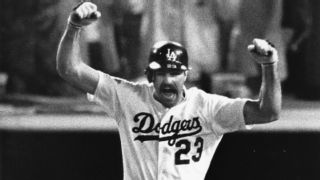  Hershiser: If you watch the video, his fist is up before he rounds first base, so he knew it was gone, and then he starts pumping his fists as he rounds second base. It was incredible. Hershiser: If you watch the video, his fist is up before he rounds first base, so he knew it was gone, and then he starts pumping his fists as he rounds second base. It was incredible.
 Gibson: I never thought about pumping my fists. I don't know why I did it. It was an act of emotion. Gibson: I never thought about pumping my fists. I don't know why I did it. It was an act of emotion.
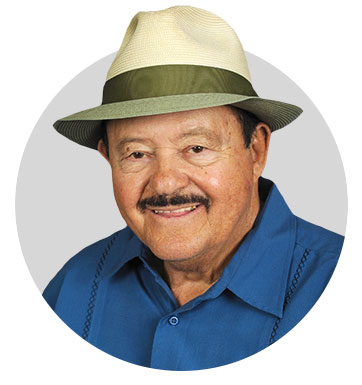 Mike Brito (Dodgers scout, famous for wearing a fedora and holding a radar gun behind home plate): I've never heard the stadium so loud. Mike Brito (Dodgers scout, famous for wearing a fedora and holding a radar gun behind home plate): I've never heard the stadium so loud.
 Gibson: It was like a movie. It was like the movie "The Natural." It was very similar. I remember the next day, when they played the open, they laid me into the scene there, and it was pretty cool. Gibson: It was like a movie. It was like the movie "The Natural." It was very similar. I remember the next day, when they played the open, they laid me into the scene there, and it was pretty cool.
 Costas: It was cinematic. Costas: It was cinematic.
 Didier: As soon as he hit the ball, I stood up and said, "Damn, it's a home run!" My wife went wild and she started hugging me, and I said, "Let me go! Let me go!" I told her to meet me in the office because I wanted to go down to the dressing room. When I got there, the players were coming in and they were yelling, "Hey, Mel, backdoor slider!" I said, "Hey! Keep quiet and hide those damn books I gave you! I don't want any writers to see that. We still got four, five, six games to play. This may come up again." I told them not to say a goddamn word about that backdoor slider until the series was over. Didier: As soon as he hit the ball, I stood up and said, "Damn, it's a home run!" My wife went wild and she started hugging me, and I said, "Let me go! Let me go!" I told her to meet me in the office because I wanted to go down to the dressing room. When I got there, the players were coming in and they were yelling, "Hey, Mel, backdoor slider!" I said, "Hey! Keep quiet and hide those damn books I gave you! I don't want any writers to see that. We still got four, five, six games to play. This may come up again." I told them not to say a goddamn word about that backdoor slider until the series was over.
 Gibson: I heard the crowd. I always did. I loved it. I enjoyed it. When you're in your moment, you're in your comfort zone. You try to create the moment in your head, and it was like a checklist in my mind. Walk up there, crowd, Eckersley, batter's box, how are they going to be defending you, what are you going to see, rounding the bases. ... You create these moments in your head much like you did when you were a kid and played Mickey Mantle or whoever hitting a game-winning home run. That's really how it was. The reality of it is you play through a hundred of those moments and they never come true, but that one did. Gibson: I heard the crowd. I always did. I loved it. I enjoyed it. When you're in your moment, you're in your comfort zone. You try to create the moment in your head, and it was like a checklist in my mind. Walk up there, crowd, Eckersley, batter's box, how are they going to be defending you, what are you going to see, rounding the bases. ... You create these moments in your head much like you did when you were a kid and played Mickey Mantle or whoever hitting a game-winning home run. That's really how it was. The reality of it is you play through a hundred of those moments and they never come true, but that one did.
 Sax: I was a bit disappointed because I wanted to hit the home run. [Laughs] It was a great sigh of relief, actually. Sax: I was a bit disappointed because I wanted to hit the home run. [Laughs] It was a great sigh of relief, actually.
 Costas: I'll never forget as the ball cleared the fence all the brake lights on in the parking lot, and I'm thinking, Even in the World Series, Dodger fans? It's a one-run game in the World Series. This isn't a midseason game against the Astros. It's a Saturday night. What do you have to get home for? Get up early for church? What are you doing? Costas: I'll never forget as the ball cleared the fence all the brake lights on in the parking lot, and I'm thinking, Even in the World Series, Dodger fans? It's a one-run game in the World Series. This isn't a midseason game against the Astros. It's a Saturday night. What do you have to get home for? Get up early for church? What are you doing?
 Josh Suchon (play-by-play announcer and author of "Miracle Men"): There's more than just that one famous car slamming on the brakes. There were a lot of people who left early. In my mind, that forever branded Dodgers fans as leaving early. That image of some guy slamming on his brake during the most dramatic home run in baseball history forever branded Dodger fans as leaving early. Josh Suchon (play-by-play announcer and author of "Miracle Men"): There's more than just that one famous car slamming on the brakes. There were a lot of people who left early. In my mind, that forever branded Dodgers fans as leaving early. That image of some guy slamming on his brake during the most dramatic home run in baseball history forever branded Dodger fans as leaving early.
 Costas: When he came off, I shouted to him and he looked back at me and gave me a just-one-minute thing. I always thought this was really cool: In the immediate aftermath he wanted to spend a minute with his teammates. He didn't want to be diverted to me for the interview. So he went in the clubhouse and whooped it up with his teammates and came back out onto the field for the interview. Costas: When he came off, I shouted to him and he looked back at me and gave me a just-one-minute thing. I always thought this was really cool: In the immediate aftermath he wanted to spend a minute with his teammates. He didn't want to be diverted to me for the interview. So he went in the clubhouse and whooped it up with his teammates and came back out onto the field for the interview.
 Davis: Kirk came in and hobbled to the center of the room and did his signature chant that we would do in the locker room. "1-2-3, what a bleeping team!" There was another choice word in there. We did that during the season. We had some moments during the year where you saw something special taking place with this team, and Kirk Gibson was the catalyst. Davis: Kirk came in and hobbled to the center of the room and did his signature chant that we would do in the locker room. "1-2-3, what a bleeping team!" There was another choice word in there. We did that during the season. We had some moments during the year where you saw something special taking place with this team, and Kirk Gibson was the catalyst.
 Gibson did not have another plate appearance in the Series, but the momentum from his home run carried the Dodgers to a five-game upset of the A's. "It doesn't make sense, to be quite honest with you" Lasorda: He never came to bat again, but he paralyzed them. They were stunned. They stood on that field for a good five minutes just standing there. They couldn't believe what had happened. Lasorda: He never came to bat again, but he paralyzed them. They were stunned. They stood on that field for a good five minutes just standing there. They couldn't believe what had happened.
 Joe McDonnell (reporter for KFI and AP radio): It was the only time a World Series was ever won in Game 1. I have no doubt in my mind that the series was over after that. It demoralized them. Joe McDonnell (reporter for KFI and AP radio): It was the only time a World Series was ever won in Game 1. I have no doubt in my mind that the series was over after that. It demoralized them.
 Eckersley: It was Game 1, but it felt like more. It just felt bigger. It felt like you were deep into that series after that home run. It was just the first game, but you knew Hershiser was coming the next night, and nobody could beat him back then. Eckersley: It was Game 1, but it felt like more. It just felt bigger. It felt like you were deep into that series after that home run. It was just the first game, but you knew Hershiser was coming the next night, and nobody could beat him back then.
 La Russa: In a seven-game series, one dramatic game change can be the turning point in the series, whenever it comes, especially if it comes late and turns a loss into a win. La Russa: In a seven-game series, one dramatic game change can be the turning point in the series, whenever it comes, especially if it comes late and turns a loss into a win.
 Costas: I saw something after that game that you seldom see at Dodger Stadium. People did not leave. The game was over, and they wanted to hold on to the moment for so long. A huge portion of the crowd remained long after the game, just soaking up the scene. I'll never forget looking up into the stands after I had interviewed Gibson on the field and [seeing] Tom Brokaw, and he looked at me and gave me a look like, "Isn't this one of the greatest things you've ever seen?" Costas: I saw something after that game that you seldom see at Dodger Stadium. People did not leave. The game was over, and they wanted to hold on to the moment for so long. A huge portion of the crowd remained long after the game, just soaking up the scene. I'll never forget looking up into the stands after I had interviewed Gibson on the field and [seeing] Tom Brokaw, and he looked at me and gave me a look like, "Isn't this one of the greatest things you've ever seen?"
 Claire: I left my box, as I had done after hundreds of games, and walked along the club level of Dodger Stadium, and there was nobody in the aisles. Everybody was still standing at their seats. I walked out of the main doors, and there was nobody in the parking lot. I walked to my car and drove out of Dodger Stadium, and I was literally the only car driving in the lot. There was still such a roar behind me. It was almost like a "Twilight Zone" episode. It was so surreal. It was truly an unreal scene. I've never experienced anything like it. Claire: I left my box, as I had done after hundreds of games, and walked along the club level of Dodger Stadium, and there was nobody in the aisles. Everybody was still standing at their seats. I walked out of the main doors, and there was nobody in the parking lot. I walked to my car and drove out of Dodger Stadium, and I was literally the only car driving in the lot. There was still such a roar behind me. It was almost like a "Twilight Zone" episode. It was so surreal. It was truly an unreal scene. I've never experienced anything like it.
 Scully: They stayed. They relished the moment. They didn't want to let go. It's like Christmas morning and you're kids. You don't want to have lunch come. You want to hold it as long as you can. We signed off the game, and I just walked. I can't describe why, but I was so hyper. I don't root. I'm not a fan. I'm there to work, but I was still on top of the tide of emotion that had swept through the stadium. Maybe that's what I was doing, taking a psychological surfboard ride on this wave. I just couldn't sit down. Scully: They stayed. They relished the moment. They didn't want to let go. It's like Christmas morning and you're kids. You don't want to have lunch come. You want to hold it as long as you can. We signed off the game, and I just walked. I can't describe why, but I was so hyper. I don't root. I'm not a fan. I'm there to work, but I was still on top of the tide of emotion that had swept through the stadium. Maybe that's what I was doing, taking a psychological surfboard ride on this wave. I just couldn't sit down.
 Fred Wallin ("Dodger Talk" postgame show host 1987-89): Normally "Dodger Talk" would go to the top of the next hour. So during the regular season, if the game ended at 10:15, we'd go until 11. Game 1 ended around 9, but because of Gibson's home run, KABC's general manager, George Green, called and said, "You're going all night until the calls stop." I was there until 1:30 in the morning taking calls, and we could have taken more calls when I finally signed off. Fred Wallin ("Dodger Talk" postgame show host 1987-89): Normally "Dodger Talk" would go to the top of the next hour. So during the regular season, if the game ended at 10:15, we'd go until 11. Game 1 ended around 9, but because of Gibson's home run, KABC's general manager, George Green, called and said, "You're going all night until the calls stop." I was there until 1:30 in the morning taking calls, and we could have taken more calls when I finally signed off.
 McDonnell: In those days, you could go into the training room after games as a reporter. Everyone was looking for Gibson, and I walked into the training room and there's no one in there except for Gibson, and he's in the shower. This is going to sound ridiculous, but he's all lathered up and he looked at me and had this big s--t-eating grin and said, "That was neat, wasn't it?" I'll never forget the look on his face when he said it. McDonnell: In those days, you could go into the training room after games as a reporter. Everyone was looking for Gibson, and I walked into the training room and there's no one in there except for Gibson, and he's in the shower. This is going to sound ridiculous, but he's all lathered up and he looked at me and had this big s--t-eating grin and said, "That was neat, wasn't it?" I'll never forget the look on his face when he said it.
 Eckersley: There was no eye contact from anybody. It was just a very surreal, lonely feeling. You're all alone because nobody knows what to say. Nobody even looked at me. What a moment. It was the opposite of euphoria. It's an incredible emotion, but the kind you don't want. I had to meet with reporters after the game, and I must have answered the same question a thousand times: backdoor breaking ball. I answered that question to every goddamn guy in that room. I didn't budge. It was probably one of the proudest moments in my life. It seemed like the right way to do it. I was still in shock. I was actually lucky to be where I was at the moment. I had only been closing for a year and a half, and where I was personally, I had gone through recovery [for alcoholism]. I was a different person, and I was grateful to be where I was at that time. It lessened the pain, I guess. Eckersley: There was no eye contact from anybody. It was just a very surreal, lonely feeling. You're all alone because nobody knows what to say. Nobody even looked at me. What a moment. It was the opposite of euphoria. It's an incredible emotion, but the kind you don't want. I had to meet with reporters after the game, and I must have answered the same question a thousand times: backdoor breaking ball. I answered that question to every goddamn guy in that room. I didn't budge. It was probably one of the proudest moments in my life. It seemed like the right way to do it. I was still in shock. I was actually lucky to be where I was at the moment. I had only been closing for a year and a half, and where I was personally, I had gone through recovery [for alcoholism]. I was a different person, and I was grateful to be where I was at that time. It lessened the pain, I guess.
 Gibson: Whenever I come to Dodger Stadium, I immediately look out to right field and the seat where I think the ball landed that I've named Seat 88. It's a good affirmation for me in my life. I remember how hard it was and how lucky I was to have done it. There's really no reason how I accomplished it, given what the situation was, who I was going up against and the state of my physical being. It's evidence that anyone who believes that they can't do it can. I gave them a reason to believe that they could. Someway, somehow the ball went out of the ballpark and we won the World Series. Gibson: Whenever I come to Dodger Stadium, I immediately look out to right field and the seat where I think the ball landed that I've named Seat 88. It's a good affirmation for me in my life. I remember how hard it was and how lucky I was to have done it. There's really no reason how I accomplished it, given what the situation was, who I was going up against and the state of my physical being. It's evidence that anyone who believes that they can't do it can. I gave them a reason to believe that they could. Someway, somehow the ball went out of the ballpark and we won the World Series.
 La Russa: I've been a baseball fanatic since I was 5 years old, so when you see moments like that, you have to appreciate it. I was a s---ty player and had no business being there, so I have to appreciate it. I don't think there's ever been a more dramatic moment in baseball because of the circumstances. That being said, whenever I see it shown, I look away every time. I will not look at it. As soon as I see it, I look away. I've seen it too many times. Enough is enough. La Russa: I've been a baseball fanatic since I was 5 years old, so when you see moments like that, you have to appreciate it. I was a s---ty player and had no business being there, so I have to appreciate it. I don't think there's ever been a more dramatic moment in baseball because of the circumstances. That being said, whenever I see it shown, I look away every time. I will not look at it. As soon as I see it, I look away. I've seen it too many times. Enough is enough.
 Eckersley: As a fan, I can appreciate that moment now. I have so much distance from it now, it's almost like I didn't do it. When I watch it now, it's almost like it wasn't. That guy did, not me. Eckersley: As a fan, I can appreciate that moment now. I have so much distance from it now, it's almost like I didn't do it. When I watch it now, it's almost like it wasn't. That guy did, not me.
 Costas: It has two of the greatest calls in baseball history on the same play. Scully's on television and Jack Buck's "I don't believe what I just saw" on radio. I think the moment, just like Bobby Thomson's "Shot Heard 'Round the World," would not live the way it does today without Russ Hodges' call. I think that moment, as great as it was, has been elevated historically by the calls that accompanied it. A lot of people not old enough to remember it firsthand now think they have the feel because those calls capture the goosebump-raising nature of it. Costas: It has two of the greatest calls in baseball history on the same play. Scully's on television and Jack Buck's "I don't believe what I just saw" on radio. I think the moment, just like Bobby Thomson's "Shot Heard 'Round the World," would not live the way it does today without Russ Hodges' call. I think that moment, as great as it was, has been elevated historically by the calls that accompanied it. A lot of people not old enough to remember it firsthand now think they have the feel because those calls capture the goosebump-raising nature of it.
 Gibson: I've got the tapes of the radio calls and the TV call, and from time to time I'll pop them in and listen to them. Gibson: I've got the tapes of the radio calls and the TV call, and from time to time I'll pop them in and listen to them.
 Scully: You can't prepare for such a moment. In all honesty, it was the farthest thing from my mind that he would hit a home run. He's hobbling; I'm praying he doesn't strike out; and he goes to the extreme and hits a home run. Years later, I told him, looking over my career, my greatest single contribution to the Dodgers was getting you off that training table. Scully: You can't prepare for such a moment. In all honesty, it was the farthest thing from my mind that he would hit a home run. He's hobbling; I'm praying he doesn't strike out; and he goes to the extreme and hits a home run. Years later, I told him, looking over my career, my greatest single contribution to the Dodgers was getting you off that training table.
 Gibson: It's a good story. It doesn't make sense, to be quite honest with you. For me, what I do now as a manager, my motivation is to get back to that moment for somebody and to have them prepared for that moment and find their place in baseball history. That's the ultimate goal. Something tells me I will be a part of some moment again. I just feel it. Gibson: It's a good story. It doesn't make sense, to be quite honest with you. For me, what I do now as a manager, my motivation is to get back to that moment for somebody and to have them prepared for that moment and find their place in baseball history. That's the ultimate goal. Something tells me I will be a part of some moment again. I just feel it.
|

